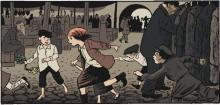- Home
- Dave Eggers
The Captain and the Glory Page 2
The Captain and the Glory Read online
Page 2
The Captain pictured himself telling all these people that they were dismissed, or fired. He had a wonderful vision of himself standing straight in front of them and saying, “You’re all relieved of your duties! You have one minute to vacate the bridge!” In his vision he was very tall and strong, and the staff was very meek and intimidated.
But the idea of actually firing anyone gave him a stomachache, so he asked his daughter to do it. Shrugging, she dismissed the staff captain, the chief engineer, the quartermaster, the chief radio operator, the safety officers, the starbolins, on and on—in short, everyone on the ship who knew how to operate the ship and was within earshot.
When they were gone, the bridge was empty and the Captain felt much more at ease. For a few minutes, the Captain and his daughter and her doll sat in silence, each of them already bored and each of them wishing they could be somewhere else.
“I’m gonna make an announcement,” the Captain said.
“Sounds good, Dad,” his daughter said.
He turned on the microphone that broadcast to the entire ship. “We will take you on a voyage you will never forget!” he said.
That was a good start, he thought, and his daughter, and many of the passengers, agreed.
“So where should we go?” the daughter asked her father.
The Captain brightened. “I want to go somewhere really tremendous,” he said. “Somewhere that’s better than anywhere we’ve been before, but also like the past, and also yellow.” The Captain, his daughter, and her doll stood for a while on the bridge, thinking of where someplace like that might be.
* * *
—
Night came on, and no thoughts had come to any one of them. For a moment, sometime after midnight, the doll’s vacant eyes seemed to flicker briefly, but it was simply a trick of the light.
IV
FOR AS LONG as he could remember, the man with the yellow feather had trouble sleeping. His head was full of arguments and recriminations, and in the dark he turned in his bed like a restless kitten.
When he was chosen to steer the ship, he held out the vague hope that his new quarters and new position might bring with them better rest, but this was not to be. The first night in his stateroom bed, he couldn’t sleep at all.
The Captain was lying prone, staring at the ceiling as he usually did, waiting for sleep but instead fighting a thousand battles in his mind against his former teachers who had not thought him brilliant, all the women who did not swoon when he pushed his genitals at them in elevators and on streets, and all the passengers on the boat who had not voted to make him captain.
Then came the spider. It was simply there, on the ceiling, upside down, as if it had been there all along, somehow defying gravity—defying the sanctity and cleanliness of his stateroom. It scampered determinedly across the ceiling and then stopped directly over his bed. Directly over his face! The Captain muffled a scream. Then, slowly, so as not to invite the possibility of the spider noticing him and descending upon him, the Captain inched his way off the bed and, with a thump much too loud for his subterfuge, fell onto the floor and rolled himself into the corner.
He looked up. No! The spider had followed him on the ceiling, as if mirroring his movements. The Captain let out a whimper, for he was afraid often, hourly in fact, of everything from germs to women-not-wearing-bathing-suits to jai alai, but he was certain he’d never been so afraid as when he looked up and saw that spider on the ceiling over him.
The Captain knew he could not get back into that bed. Perhaps not ever. He also knew that he was not safe anywhere in the stateroom. But then he had an idea. From his vantage point he could see that the bed was higher than the average bed, and had quite a bit of clearance underneath the mattress. If he could scamper from the corner of the room and slither under the bed, he could stay there, perhaps even sleep there, knowing that the spider could not see him and could not get at him.
And so the Captain moved in a serpentine way from his corner of the room to the space under the bed, feeling sure at any moment the spider would descend upon him, would touch him with its tiny serrated limbs…But then the Captain made it. When he arrived in the claustrophobic darkness under the bed, he felt immeasurable relief. He was safe there, unseen there, and knew instantly that this was where he would sleep that night and all nights thereafter—on the floor, under his bed.
“Psst,” said a voice. The Captain looked left and right, worrying briefly that the spider tormenting him was the kind of spider that could talk.
“Psst,” the voice said again. Now the Captain located the source of the sound. It was coming from the vent on the wall next to the bed. He inched closer to it.
“Yes?” he said into the vent.
“Captain,” the voice said, distant but insistent. “I have much to tell you. First, I must congratulate you on eluding and outsmarting that terrifying arachnid. Spiders, as a man of your intellect no doubt knows, are the world’s most dangerous carriers of germs, and also they cause rectal bleeding.”
The Captain did not know these spider-facts involving germs and rectal bleeding, but he did not let the voice in the vent know he did not know these things. He liked the sound of the word intellect being applied to him, and did not want to risk its new proximity to his name.
“This ship has long had a problem with spiders, as you of course are aware,” the voice in the vent said. “We are practically infested with them. It’s a big problem, a disgrace really, and could lead to the destruction of the ship and maybe the world.”
The Captain had never seen a spider on this ship, and had never heard anyone speak of a spider on this ship—which is why the sight of the one on his ceiling had given him such terror. But now that the voice in the vent mentioned it, the Captain was certain that he had in fact heard about the spider problem, that it was a big problem, a disgrace really, was in fact an infestation that threatened the ship and the world.
“I, too, have made the rational choice to sleep under the bed,” the voice in the vent said. “It keeps me safe from the rectal-bleeding spiders, and also certain people who make me uncomfortable, like for instance anyone who might be called swarthy.”
The Captain felt a great smile overtake his face. This voice coming from the vent, more than anyone he’d ever met—even his daughter, who was a solid 9—understood him. The Captain, too, was made uncomfortable by certain people who might be called swarthy, but had never thought that simply hiding under his bed would be the solution. But it was!
And so, because the Captain was awake, and had nothing else to do, he listened closely over the next few hours, as the voice in the vent said a great many fascinating things, so many things that the Captain had suspected but had never felt the courage to say. The voice in the vent advanced a quite rational theory that it was actually 297 years earlier than commonly believed, and this was the fault of Pope Sylvester (a very bad guy). He explained that certain sandwiches were not good. He explained that the historic adversaries of the Glory—various pirate crews who plagued the seas, looting and beheading innocents—were in fact admirable go-getters that the Captain would be wise to work with on various initiatives. He lucidly explained that the crew members who worked in the engine room were plotting against the Captain, and he said that the ship would be better if certain people, who looked a certain way and were from certain places, were to be thrown overboard.
The Captain listened, rapt, as the voice in the vent went on, listing the many things there were to fear and hate and the various ways the world not-under-the-bed was terrifying and perilous. The Captain felt at last that someone was expressing his innermost thoughts. Like the voice in the vent, the Captain loathed most people and suspected that beneath every seeming-simple truth there was a sinister lie. Like the voice in the vent, the Captain was angry and bewildered by so many things: salad, for starters, and also dictionaries, and ranch houses, and m
ustaches of course, and women-not-wearing-bathing-suits. The voice in the vent was angry and bewildered by all these things, too, and had very brilliant theories about these fearful factors, how they were connected in a coordinated way designed to undermine the Captain and make the ship less good. As the voice in the vent continued, the Captain felt himself growing stronger. He felt, as the voice talked through the night, that he had made a true friend, an advocate, an ally—a north star.
V
WHEN THE SHIP’S passengers woke that morning and went to breakfast, the cafeteria wipe-away board, which customarily described the day’s weather and menu, now featured a series of messages scrawled in the handwriting of a child.
RECTAL BLEEDING SPIDERS RUNNING AMOK ON SHIP :(
*
PEOPLE WHO “RUN” ENGINES ARE YOUR ENEMIES.
*
MY P-NUS: WOMEN HAVE ENJOYED!!
*
ALSO PROBABLY SOME PEOPLE WILL BE THROWN OVERBORED SOON.
As the passengers ate their breakfast, they puzzled over the messages on the board. They knew they were written by the Captain, for the Captain’s crude handwriting was distinctive, and he was the only adult on the ship inclined to misspell common words, capitalize at random, and use frowny-faces at the ends of sentences.
The passengers deduced that the Captain had woken up before anyone else, and had come down to the cafeteria to write messages, entirely unrelated to the work of steering the ship, on a wipe-away board that usually contained notices about rain and soup.
“This is quite different than before,” one of the passengers said. And no one could argue the point. Things had changed.
After breakfast, the business and leisure of the ship’s passengers went on more or less as before. Children played ping-pong and puttered in the pool and parents watched and worried and strolled the promenades. There was work done in offices and gardens and galleries and libraries. There were parties, picnics, and potlucks, though during all of these everyday activities, the passengers were faintly distracted by the thought of the Captain’s septuagenarian phallus and the women against whom he might have rubbed it. And, they thought, didn’t he also mention something about people being thrown overboard? There were hundreds of discussions throughout the day about the new Captain and his new way of communicating.
“I find it refreshing,” one woman said. “He speaks his mind.”
“He writes like I speak when I’m drunk,” another man said, “and I find that comforting.”
For as long as the passengers could remember, every previous captain had simply been the Captain, distinguished and calm, guiding the ship and occasionally appearing at dinner in formal attire. When these previous captains spoke at all, they had expressed themselves with quiet reserve and dignity. They used complicated words regularly, and while giving speeches, they read from note cards—all of which, the supporters of the new captain realized, conveyed dishonesty and a certain palpable elitism.
In the eyes of the Most Foul, though, this new captain was candid and unvarnished. And because he didn’t know how to spell, and had no taste or manners or filter or shame or sense of what was true and what was false—because he was unscripted when he told lies—he was the most honest captain they’d ever known.
That first morning, when they saw his scrawlings on the wipe-away board, these passengers realized that all along, what they had wanted from their captain were not bland messages about the weather and food. What they wanted all along were garbled messages, written before dawn, about the captain’s fears, enemies, and penis.
VI
FOR THE CAPTAIN, putting his most personal and troubled thoughts onto a wipe-away board for all to see relieved a volcanic pressure within him. On the morning of his first wipe-away messages, almost immediately after rendering his last misspelled word, his solace was profound. He scampered back to the bridge and his mind was so restful and unburdened that he lay down on his bed—under his bed—to take a nap.
“Psst,” the voice said. “Nice going with the messages on the board.”
The Captain’s heart swelled. Though he’d only known the voice in the vent for a short time, he felt that next to his beautiful daughter—who had been wearing a really sexy number that day, angora probably, he couldn’t get it out of his mind, good god—there was no one whose approval he sought and valued more.
The Captain and the voice in the vent had another wonderful talk that night. The voice in the vent told him about how clouds were full of chemicals that reduced sperm count, and that most forks were covered in pubic hair and should not be used. He explained that pork was actually putty and that all books were written by people who could not get erections and who were plotting against the Captain, in league with the spiders-with-rectal-bleeding. He also reminded the Captain that it was high time he threw some people overboard.
* * *
—
The next morning, the passengers on the ship read a new series of messages on the wipe-away board.
ALSO ABOUT MY P-NUS: MUCH BETTER THAN PREVIOUS CAPTAIN’S.
*
THIS WEEK: EVERYONE GETS AN XTRA $1.50!
*
SOME PASSENGERS TO BE THROWN IN OCEAN SOON!!
*
HAPPY SINCO DE MAYO
The ship’s passengers, even the Most Foul, were conflicted. They were pleased that they would be receiving another $1.50 that week, but they were also concerned about the spiders who caused bleeding, and the fact that the Captain had been captain for many days, and the ship had not yet left port.
VII
THAT MORNING, HIGH ABOVE, the Captain stood on the bridge, looking around him. As he scanned the horizon, he noticed something. The ship did not seem to be moving. He turned to his daughter. “Why are we not moving?” he asked her.
“There are no people currently navigating the ship,” she said. “Remember when we fired everyone?”
The Captain looked at her and knew she was right. She was always right. She was so smart, he thought. She was also so gorgeous, and curvaceous, and so demure that when he thought of her, his mind went caterwauling into unsavory places.
“We do have this,” she said, and retrieved a very thick book, its cover bright orange, that read Ship’s Manual on its spine. His daughter began paging through it, oohing and even ahhing, noting the level of detail and instruction contained within and making sounds of gratitude and relief.
“Can I see that?” he said, and snatched the book from his daughter’s beautiful hands. He left the bridge and walked to the railing and threw the book overboard. Its pages briefly fanned, like a bird in spastic flight, before its covers closed again and the book hit the sea with a stentorian slap. The Captain watched the manual sink quickly in the violet sea.
But it did not, in fact, sink. It continued to float on the water. “Why isn’t that thing sinking?” the Captain asked.
“I don’t know, Dad,” his daughter said. “It’s probably designed to float.”
The Captain watched as the book got smaller as the tide took it away from the Glory, and though he would have preferred it to sink without a trace, at least it was gone, and the tightening in his chest that he’d felt in its presence was gone, too. Books like that, he felt, were for people without natural talent and without innate leadership ability, and worse, they implied that there had been captains before the Captain and that there would be captains after, and both notions made the Captain feel something approaching insignificance, and this was a kind of affront against the Captain that he could not abide. He felt sure he needed a cheeseburger made by teenagers and wrapped in paper.
After eating his cheeseburger made by teenagers and wrapped in paper, the Captain and his daughter and her doll then went about filling the roles of all the crew members they had fired. But because the Captain
was suspicious of anyone who had done a job before, he chose carefully, to ensure that no one he hired to handle any part of the ship had ever seen that part of the ship before.
In the role of chief engineer, he put a man he’d met by the pool one day and who said he liked the captain’s feather. In the role of first officer, he placed one of his daughter’s friends, who had long legs and gorgeous hair and had many times allowed the Captain to stare at her while she ate salad. In the role of chief electrician, he put Eddie the Whack. In the place of chief navigator, he put Pete the Pipe. In fact, he found spots for all of his old friends. Fingers handled the money, Sweetie handled the food, Patsy the Murderer took over the infirmary, and Paul the Manafort oversaw the ship’s office of ethics and accountability. The ship’s pet shelter was replaced by an abattoir. The ship’s teachers were replaced by cops. The ship’s theater group was replaced by a television. The ship’s librarian was replaced by a television. The ship’s historian was replaced by a television. The ship’s symphony was replaced by a television playing patriotic songs, and to head up the agency that supported small businesses, the Captain appointed the wife of the guy who ran the World Wrestling Federation.
The one group of people he was not allowed to replace—it was an unbreakable rule of the ship, and thus he considered it a disgrace—were those in the engine room. Because the voice in the vent had instructed him not to talk to the engine-room people (because they were his enemies) the Captain told his daughter to tell Fingers to call the engine room and have them start the engines. It worked. They started the engines, and the boat groaned awake.

 A Hologram for the King
A Hologram for the King Heroes of the Frontier
Heroes of the Frontier A Heartbreaking Work of Staggering Genius
A Heartbreaking Work of Staggering Genius The Best American Nonrequired Reading 2013
The Best American Nonrequired Reading 2013 How We Are Hungry
How We Are Hungry The Circle
The Circle What is the What
What is the What The Museum of Rain
The Museum of Rain The Captain and the Glory
The Captain and the Glory Up the Mountain Coming Down Slowly
Up the Mountain Coming Down Slowly The Parade
The Parade The Monk of Mokha
The Monk of Mokha Your Fathers, Where Are They? And the Prophets, Do They Live Forever?
Your Fathers, Where Are They? And the Prophets, Do They Live Forever? You Shall Know Our Velocity
You Shall Know Our Velocity The Wild Things
The Wild Things 2006 - What is the What
2006 - What is the What The Best American Nonrequired Reading 2011
The Best American Nonrequired Reading 2011 Created in Darkness by Troubled Americans
Created in Darkness by Troubled Americans